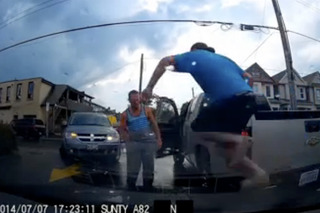An Austin woman was driving home from work when a black car suddenly pulled directly into her path. The incident left her shaken and other drivers stunned by her evasive maneuver—but the real shock came when she learned this might be part of a growing trend targeting drivers across the country.
Now she’s convinced that what seemed like a near-fatal accident may have actually been a deliberate insurance fraud scheme.
Terrifying Texas T-Bone Near-Miss: New Insurance Scheme?
In a viral video with more than 56,000 views, content creator Clee Mazzulla (@cleemazzulla) recounts the harrowing experience that nearly ended in tragedy.
She was traveling at approximately 45 to 50 miles per hour on Burnett Road in the Texas city when she spotted a beat-up, small black car with two occupants sitting in the middle of the road ahead.
“They pulled out right in front of me, like, 30 yards away,” she says in the TikTok. “I had to swerve so hard to get around them.”
Mazzulla explains that she was almost certain she would hit the vehicle. But by “the grace of God,” she managed to swerve around the car without making contact. The maneuver was so dramatic that other drivers pulled up to check on her at the next light, with one witness comparing it to “Tokyo drift.”
The incident left her crying and shaking at the stoplight, still processing how close she came to a potentially fatal T-bone collision.
But what witnesses told her next transformed her understanding of what had happened.
Other drivers informed her that the black car had been sitting stationary in the road for approximately five minutes before pulling out directly in front of her vehicle. The timing seemed deliberate to them, rather than accidental.
Mazzulla’s boyfriend later connected the incident to Texas auto insurance claim scams. She’d also seen reports about people intentionally staging accidents.
The realization that someone might deliberately create a life-threatening situation for financial gain left her outraged.
“I don’t know why people are actually putting lives in danger to get money or get insurance on a car, but it’s [expletive] ridiculous,” she says.
She describes the suspicious vehicle as an older, small black car in beat-up condition, though she wasn’t able to capture the make, model, or license plate in the chaos.
Mazzulla then issues a warning to other Austin drivers to watch for similar vehicles and remain vigilant on the roads.
“I’ve never faced a more, honestly, deadly potential car crash,” she says, urging drivers to stay off their phones and pay attention while behind the wheel.

Understanding “Crash for Cash” Insurance Fraud Schemes
Staged auto accidents, in which criminals deliberately cause collisions to file fraudulent insurance claims, have become a significant problem across the United States. The National Insurance Crime Bureau (NICB) receives more than 100,000 questionable insurance claims annually, with over 70% auto-related.
These fraudulent schemes cost the insurance industry approximately $30 billion per year. Those losses are ultimately passed on to policyholders through higher premiums, adding to to insurance costs for average drivers.
Staged accidents typically fall into three categories: orchestrated collisions where criminals deliberately cause accidents with innocent drivers, paper accidents where no collision actually occurred but false claims are filed, and caused accidents where fraudsters intentionally crash into victims’ vehicles.
Criminals often target specific demographics, including women driving alone and senior citizens, as they’re perceived as less likely to be confrontational. They also focus on new vehicles, rental cars, and commercial vehicles because these tend to have better insurance coverage.
The schemes have become increasingly organized, with some operations involving complex criminal networks. In one notable case in New Orleans, federal prosecutors charged 47 defendants who collectively staged 77 crashes with tractor-trailers and commercial vehicles, collecting hundreds of thousands of dollars through fraudulent settlements.
The operation involved “slammers” who intentionally caused accidents, “spotters” who removed the slammers from the scene, and corrupt attorneys who filed the fraudulent claims.
In California, the Department of Insurance recently warned drivers about an increase in related scams where tow truck companies work with body shops to hold vehicles hostage for cash payments after accidents. One investigation uncovered an organized fraud ring that illegally collected $217,000 through various schemes, including obtaining traffic collision reports through corrupt California Highway Patrol employees and then contacting victims while pretending to represent their insurance companies.
Warning signs that drivers may be targeted include a tow truck arriving within minutes of an accident before you’ve had time to call anyone, being told which body shop your vehicle must go to rather than having a choice, and being asked to sign documents or accept a rideshare without speaking to your insurance company first.
Commenters React
“My husband put a dash cam in my car because I swear people are driving more and more crazy,” a top comment reads.
“THIS HAPPENED TO ME A FEW DAYS AGO! It was a black car but on freaking 35 heading from Mueller to downtown. They stopped in the middle of the highway suddenly and I BARELY was able to get over,” a second shared.
“As an auto insurance adjuster, PLS get a dash cam!” another wrote.
Motor1 reached out to Mazzulla for comment via Instagram and TikTok direct message. We’ll be sure to update this if she responds.
